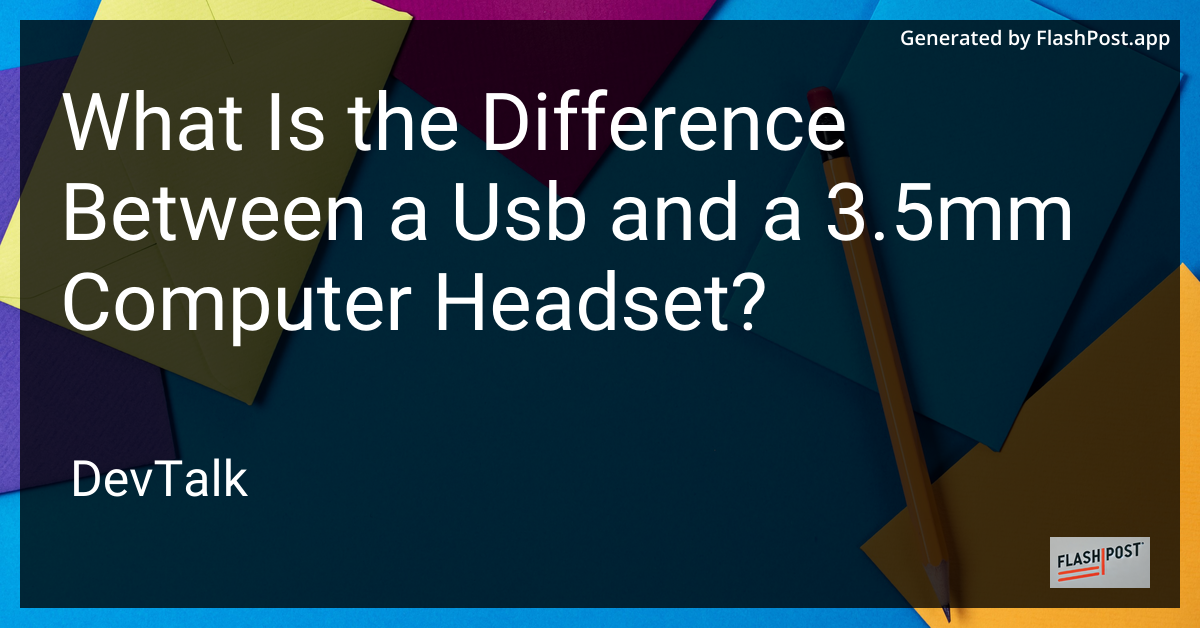What Is the Difference Between a Usb and a 3.5mm Computer Headset?
 # What is the Difference Between a USB and a 3.
# What is the Difference Between a USB and a 3.
5mm Computer Headset?
In today's digital age, headsets have become essential for a wide range of computer-based activities, from virtual meetings to immersive gaming experiences. Two of the most common types of computer headsets are USB and 3.5mm headsets. While they might seem similar at a glance, these headsets have distinct differences that can impact your audio experience. In this article, we will delve into the key differences between USB and 3.5mm computer headsets to help you make an informed decision.
Understanding USB Headsets
USB headsets connect to your computer via a USB port. This digital connection allows USB headsets to offer several features that might not be available with traditional analog connections like 3.5mm. Here’s what makes USB headsets stand out:
- Built-in Sound Processing: USB headsets typically come with their own sound card built into the headset itself. This means the headset processes audio independently of your computer's sound card, potentially offering better sound quality and effects.
- Plug-and-Play Convenience: Most USB headsets are designed for easy setup. You simply plug them into a USB port, and they're usually ready to use without needing additional configuration.
- Advanced Features: Many USB headsets come with enhanced features such as surround sound, noise cancellation, and custom equalizer settings, making them a great choice for both gamers and professionals.
Explore more on advanced gaming headset features for 2025 to learn about what innovations await in the coming years.
Understanding 3.5mm Headsets
3.5mm headsets, also known as analog headsets, connect to your computer using the standard audio jack. Here's what sets 3.5mm headsets apart:
- Compatibility: 3.5mm jacks are universally compatible with most devices, including older computers, tablets, smartphones, and gaming consoles.
- Simplicity: Without the need for additional drivers or software, 3.5mm headsets provide a straightforward audio solution. They are also less likely to encounter driver conflicts or incompatibility issues.
- Cost-Effectiveness: Generally, 3.5mm headsets tend to be more affordable than their USB counterparts, making them a popular choice for those on a budget.
Key Differences Between USB and 3.5mm Headsets
- Sound Quality: USB headsets often offer superior sound processing options, while 3.5mm headsets rely on your computer's sound card for audio quality.
- Functionality: USB headsets typically provide additional features such as virtual surround sound and improved noise cancellation, whereas 3.5mm headsets offer basic audio functionality.
- Compatibility: 3.5mm headsets have broader device compatibility, while USB headsets might require specific operating systems or drivers.
- Price: Generally, 3.5mm headsets are more budget-friendly, whereas USB headsets might require a higher investment for advanced features.
Choosing the Right Headset for You
When deciding between a USB and a 3.5mm headset, consider your specific needs and usage scenarios. For gamers who desire enhanced audio features, a USB headset might be more suitable. If you have a tight budget or need compatibility with various devices, a 3.5mm headset could be the ideal choice.
For those interested in exploring headsets for various uses, check out the best gaming headset deals to find budget-friendly options.
Additionally, for users exploring multimedia experiences beyond traditional headsets, consider learning about VR headset installation.
In summary, both USB and 3.5mm headsets have their strengths and limitations. Understanding these differences will help you select the perfect audio solution for your personal or professional needs.